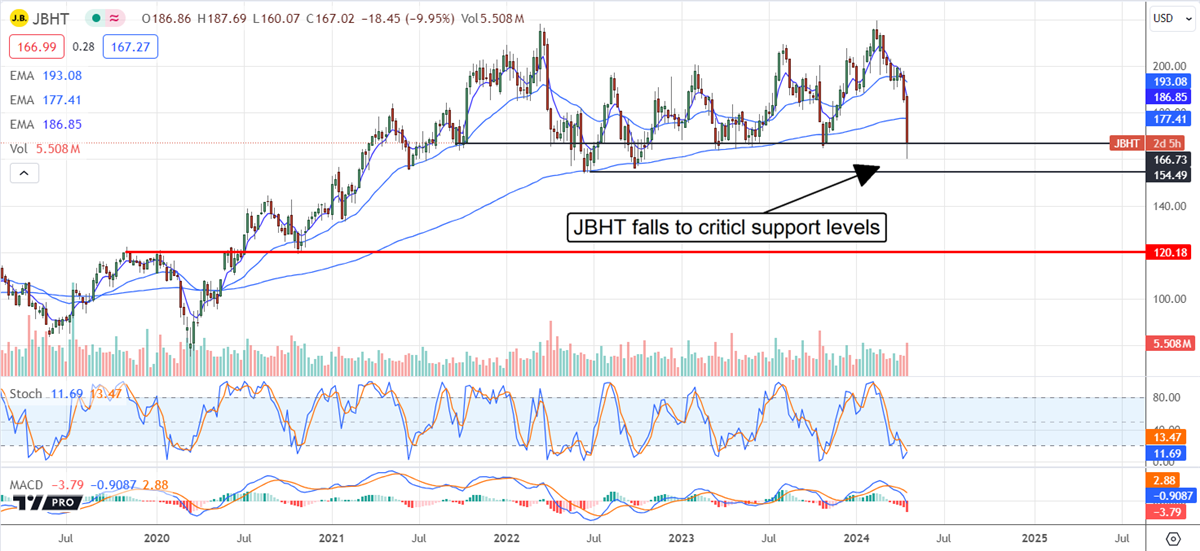
J.B. Hunt (NASDAQ: JBHT) is amid an industry normalization that will reinvigorate its market. However, the normalizing is taking longer than expected, and there are risks to the economy that point to lower price action before the recovery can begin. The primary is inflation and its impact on interest rates.
The FOMC is expected to signal an economic pivot by cutting rates this year, but inflation remains sticky, and the odds of a 2024 rate cut are declining. The latest message from Fed Chair Jerome Powell is that inflation is harder to tame than previously thought and has not made an appreciable improvement in the last three months. Because the FOMC is unlikely to cut rates over the summer as it is priced into the market, the recovery for both the economy and J.B. Hunt won't begin until they do. And that might not be until next year.
J.B. Hunt Has Broadly Weak Quarter
J.B. Hunt's business contraction is slowing compared to last year but still strong and outpacing the analysts' estimates. The company reported $2.94 billion in quarterly revenue for a decline of 9% that beat the Marketbeat consensus by 600 basis points.
Weakness was seen in most segments, driven by lower revenue per load and volume. Integrated Capacity Solutions was weakest, with a 26% decline driven by a 22% load decline. Trucking fell by 13% and Intermodal by 9% on revenue per load, while Dedicated Contract Services fell by 2% on fewer trucks. Final Mile is the only segment to grow. It grew by 2% due to contracts signed in 2023, but may experience weakness as the year progresses.
Margin is a concern because it contracted due to deleveraging on volume and yield and higher costs related to wages, insurance, interest expense and taxes. The net result is a 30% decline in operating income and a 35% contraction in the GAAP earnings. GAAP earnings of $1.22 are sufficient to sustain the dividend but fell short of the consensus by 32 cents, bringing the full-year outlook into question.
Analysts aren't expecting a robust year from J.B. Hunt or the transportation sector, but they are forecasting a pivot back to growth for the business by the end of the year. Because the Q1 results are so weak, Q2 is unlikely to match the current estimates, so analysts will likely revise the forecast lower; growth may not be in the picture until next year.
Analysts Maintain Moderate Buy Rating: Lower Price Targets
Analysts rate JBHT stock as a Moderate Buy but started trimming their price targets before release. The lowered price targets result from valuation and risk and are turning into a trend. The post-release action includes about a dozen revisions; all maintain their sentiment rating but include a lowered price target. Many new revisions have the market trading near $160 to $170, suggesting the stock is fairly valued now that it has corrected, but there is a risk of lower prices. J.B. Hunt is not expected to post a significant business improvement in the following report, likely leading the analysts to lower their targets again.
Range-Bound J.B. Hunt Is at Critical Support
The price action in J.B. Hunt is range-bound and moving lower to test support. The price action shows support near the bottom of the range, but there is still room to go before critical support levels are reached. That level is near $155. If it is broken, this stock could enter a downtrend. In that scenario, the next target for firm support is near $140.
Investors planning to hold onto JBHT will be interested in the dividend health. The company maintained its healthy balance sheet in Q1, raising its cash balance and decreasing total debt, so there are no red flags. The payout is small at less than 1% yield but safe and reliable.





